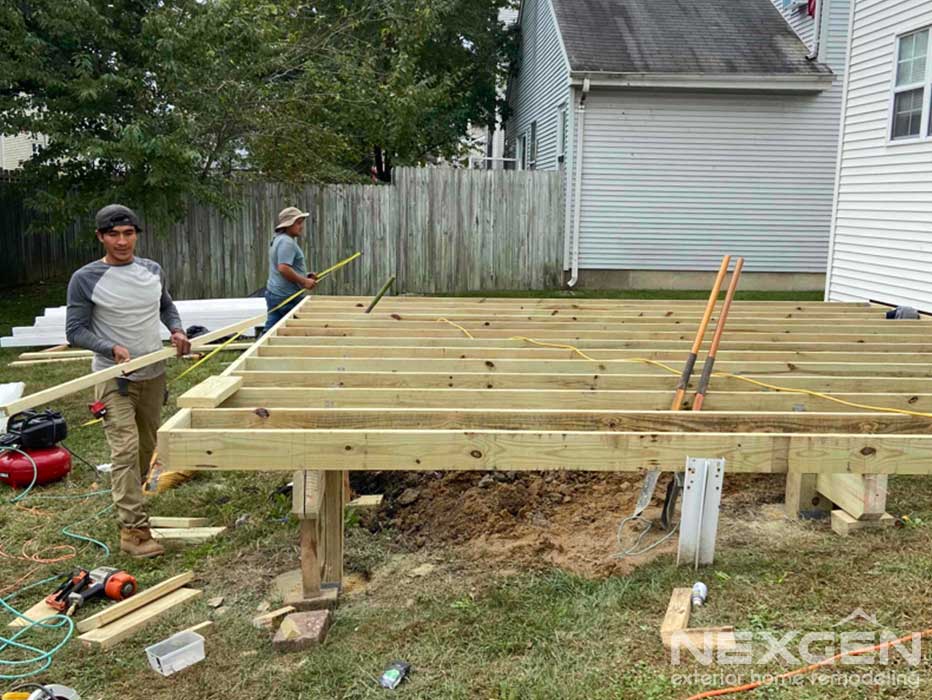If you're searching for top-rated deck installation near me, be sure to compare reviews and services.
If you're searching for top-rated deck installation near me, be sure to compare reviews and services.
Blog Article
Just how to Select the Right Products for Your Deck Setup Task
Choosing the suitable products for your deck installation job can seem difficult. There are various variables to take into consideration, from resilience and maintenance to visual appeals and environmental effect. The selection in between traditional wood and composite materials, each with its very own collection of advantages and downsides, can be especially challenging. The key is to balance your budget, design preferences, and way of living requires to produce a deck that will certainly improve your outdoor area for several years ahead.
Recognizing the Various Kinds Of Deck Products
When starting a deck installment job, the choice of products becomes a pivotal decision. Numerous alternatives are offered, each with one-of-a-kind characteristics and aesthetic charm. Conventional timber, for example, uses a classic, all-natural look and is typically extra cost-effective. It can warp over time and requires routine upkeep. Compound materials, on the other hand, are a blend of timber and plastic, supplying longevity and resistance to weather aspects. They require less maintenance compared to timber but are generally much more costly. One more choice is vinyl, which is virtually maintenance-free and resistant to bugs and rot, albeit less natural-looking. By understanding these distinctions, home owners can make an extra informed choice on the most appropriate deck material for their specific requirements.
Assessing the Toughness and Maintenance Demands of Deck Products
Evaluating the resilience and maintenance demands of deck products is a crucial step in deck installment. Sturdiness includes the product's ability to hold up against extreme weather problems, wear and tear, and its durability.
Recognizing maintenance needs is just as crucial. Some products require regular securing or discoloring to preserve their appearance and withstand moisture damage, while others, like composite decking, demand less upkeep. By assessing these aspects, one can choose one of the most ideal outdoor decking material, making certain an equilibrium in between resilience, maintenance demands, and visual allure.
Cost Evaluation: Comparing Wood and Composite Decking
Although price may at first appear like a secondary issue, it is a considerable variable when comparing timber and composite outdoor decking. On the various other hand, composite decking, while more expensive initially, calls for less upkeep, potentially decreasing long-lasting costs. Potential deck owners need to consider their budget and determination to preserve their decks when making a decision in between wood and composite outdoor decking.
Aesthetics and Layout Adaptability of Decking Products
Natural wood outdoor decking offers a traditional, classic look, while composite products provide a wide array of shades and structures to suit varied preferences and styles. Composite products, while much less adaptable in layout, are still adaptable enough for a lot of deck layouts. These variables, for that reason, are essential components in the selection of decking material.
Environmental Impact of Decking Products
When picking decking materials, one must consider not only aesthetic appeals and toughness, but also the ecological influence. It is very important to assess the sustainability of materials and check out recycled decking options. In addition, comprehending the potential influence on local environments will ensure an extra environmentally liable selection.
Evaluating Material Sustainability
In the realm of deck building, analyzing product sustainability is an important step. Composite outdoor decking products usually incorporate wood and plastic, reducing the need for new hardwood but enhancing dependence on fossil fuels - deck installation austin tx. Hence, the option of outdoor decking products need to stabilize functionality, looks, expense, and sustainability to ensure an accountable and durable installation.
Recycled Decking Alternatives

Compound outdoor decking is particularly preferred due to its toughness and simplicity of maintenance. Recycled plastic decking, on the other hand, is highly durable and calls for marginal upkeep.

Effect on Local Ecological Communities
While the advantages of making use of recycled materials for decking can not be overemphasized, it's equally crucial to think about the broader environmental implications of these choices. The removal, handling, and transport of materials can exceptionally influence neighborhood ecological communities. Logging for lumber outdoor decking contributes to habitat loss and climate modification. Even the production of composite products can release damaging discharges. Conversely, using recycled or sustainably sourced materials can aid reduce these effects. Considering the life expectancy of products can minimize ecological influence; longer-lasting choices need less regular replacement, therefore preserving resources. Appropriate disposal of old outdoor decking is vital to reducing landfill waste. Essentially, an eco-conscious deck project needs cautious material selection, lasting sourcing, and liable disposal.
Making Your Decision: Tips for Picking the Finest Deck Materials
As the post transitions into the subtopic of "Making Your Last Decision: Tips for Picking the very best Deck Materials", it Web Site is important to recognize the variety of deck materials available. Striking a balance between durability and aesthetic appeal is necessary in this choice process. The adhering to conversation will assist readers in making an educated selection based upon these crucial factors to consider.
Recognizing Different Deck Materials
The task of selecting the ideal materials for your deck setup can seem daunting because of the huge variety of alternatives readily available. Nonetheless, recognizing the various materials can streamline this procedure. Wood is a preferred selection, providing a traditional aesthetic and cost. Sorts of timber utilized consist of pressure-treated lumber, cedar, and redwood. Compound products, made from a blend of wood and plastic, are low-maintenance and resistant to rot and insects. Vinyl or PVC decks are a lot more official source sturdy and need less maintenance than composite materials, yet they can look less natural. Finally, aluminum decks are solid, lightweight, and resistant to rot, yet they are likewise the most costly option. Each material has its very own advantages and disadvantages, making it crucial to consider your certain requirements before making a last choice.
Resilience vs. Visual Appeals Balance
Stabilizing toughness with looks can be a challenge when picking deck products. The decision usually boils down to individual preferences and the deck's planned usage. High-traffic areas might necessitate sturdy materials like composite decking, which holds up against wear and tear but might do not have the natural elegance of timber. On the other hand, timber provides an ageless appeal and heat that artificial products battle to replicate. Nonetheless, it calls for a lot more upkeep and might not last as long. Home owners require to strike a balance, thinking about both the deck's useful demands and their aesthetic preferences. By doing so, they can ensure their deck continues to be a useful and attractive outside space for many years ahead.
Conclusion
In final thought, picking the right products for your deck setup job calls for mindful consideration of aspects such as resilience, upkeep, expense, looks, and ecological influence. Whether you go with typical wood or composite materials, your selection must align with your budget plan, layout choices, and way of living. Eventually, the best decking product is one that enhances your exterior space and gives pleasure for many years to find.
Report this page